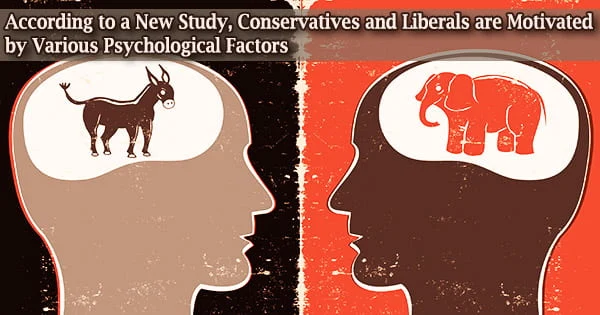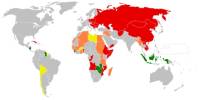According to a recent study that examines the relationship between political ideology and moral principles and motivated social cognition, liberalism and conservatism are tied to genuinely different psychological concerns, particularly those related to morality.
The research provides a further psychological understanding of the nature of political division in the United States and is published in the journal PLOS ONE.
“Psychological research on the different motives underlying support for liberal versus conservative leaders and agendas, such as those separating Biden and Trump supporters, can help to explain why, for instance, one group is much more focused on promoting equality and social justice than the other,” explains John Jost, a professor of psychology, politics, and data science at New York University and the study’s senior author.
The focus of the paper was on the relationship between political ideology and the idea of “moral underpinnings.” Social scientists have investigated the moral significance of factors like “whether or not someone followed social norms” or “whether or not someone took care of the weak or vulnerable” in this and related studies.
Some have argued in the past that conservatives have a more expansive “moral palette” that values ingroup loyalty, obedience to authority, and the enforcement of purity sanctions, which they view as “binding foundations,” whereas liberals emphasize only issues of fairness and harm avoidance, which they see as individualistic.
However, the researchers in the PLOS ONE article discovered something crucial that other investigations had overlooked.
Psychological research on the different motives underlying support for liberal versus conservative leaders and agendas, such as those separating Biden and Trump supporters, can help to explain why, for instance, one group is much more focused on promoting equality and social justice than the other.
Professor John Jost
In particular, the studies by Jost and his associates, including Michael Strupp-Levitsky, who conducted the research as an undergraduate at NYU and is currently a doctoral candidate at Long Island University-Brooklyn, demonstrated that those moral foundations known to be more appealing to liberals than conservatives, specifically fairness and harm avoidance, are linked to empathic motivation, whereas the moral foundations that are more appealing to conservatives than to liberals such as ingraciousness are not.
In actuality, the “binding foundations” highlighted by earlier studies as proof of a wide “moral palette” are associated with factors unrelated to morality, such as authoritarianism, social dominance, and economic system justification.
Additionally, they are linked to psychological motivations to lessen threat and uncertainty, which is compatible with the theory of political ideology as motivated social cognition put forth by Jost and colleagues in 2003.
“All of this may help to explain why the endorsement of ‘binding foundations’ is associated with prejudice, outgroup hostility, and other antisocial outcomes, whereas the endorsement of ‘individualizing foundations’ is negatively associated with prejudice, outgroup hostility, and other antisocial outcomes,” explains Jost.
To explore these matters in the PLOS ONE work, the researchers conducted two studies.
They asked American participants a series of questions that sought to capture different motivations (e.g., “I have an intense fear of death” and “I only think as hard as I have to”), empathies (e.g., “After being with a friend who is sad about something, I usually feel sad”), and moral intuitions (e.g., “Respect for authority is something all children need to learn”) as well as beliefs about system justification (i.e., the legitimacy of the existing social, economic, and political order) and political orientation (e.g., conservative, liberal) on social and economic issues.
The purpose of this study was to provide light on the connection between political ideology and motivated social cognition. Their findings confirmed prior research’s suggestion that liberalism and conservatism were definitely linked to psychological issues that were fundamentally distinct.
Since many years, it has been considered that the motivational underpinning of conservative preferences for “binding” intuitions is unrelated to requirements to lessen fear and uncertainty and instead represents a wide, prosocial sense of morality.
According to recent research published in PLOS ONE, however, support for “binding foundations” is connected to many of the same conservative preferences, including authoritarianism, social dominance, system justification, and underlying psychological requirements to lessen fear and uncertainty.
The article’s other authors were Strupp-Levitsky, Sharareh Noorbaloochi, a former NYU postdoc and a data scientist at Goldman Sachs, and Andrew Shipley, a former visiting scholar at NYU and founder of AGS Law.
















